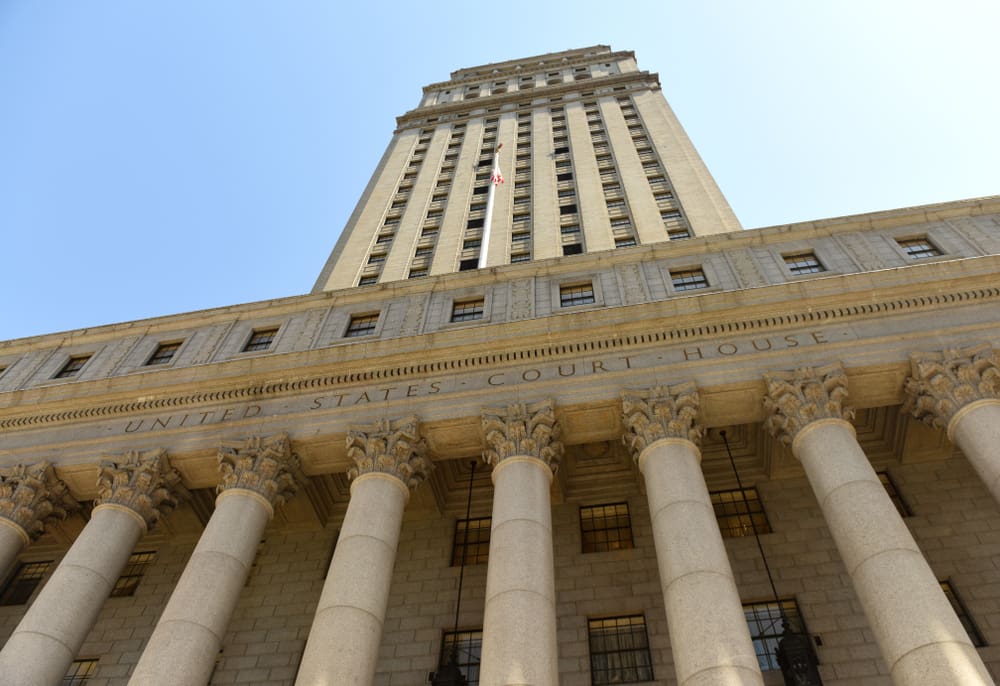
Six Jeffrey Epstein victims who sued the V.I. government in Manhattan federal court have signaled they intend to appeal a judge’s order dismissing the case against all but Delegate to Congress Stacey Plaskett.
In a motion filed Thursday in Manhattan federal court, their attorney Jordan K. Merson asked Judge Arun Subramanian to enter a final judgment as to the dismissed parties, even though claims remain outstanding against Plaskett, so that the plaintiffs may appeal his order to the Second Circuit Court of Appeals.
“The issue that was extensively argued, and ultimately led to the dismissal, was personal jurisdiction over nearly all Defendants, due to allegedly insufficient ties to New York under law set by federal courts applying New York law,” according to a memorandum accompanying the motion. “By that determination, this Court acknowledged that New York courts have not ‘weighed in on the precise question’ whether conspiracy jurisdiction theory is available” under New York’s Civil Practice Laws and Rules.
The class action suit was first filed in November 2023 by Jane Does 1-5, was amended that December to add a sixth plaintiff, and amended again last May.
The complaint alleged negligence and violations of the Trafficking Victims Protection Act, or TVPA, and the Racketeer Influenced and Corrupt Organizations Act, or RICO, claiming territory officials actively conspired with Epstein to perpetuate his sex-trafficking scheme for their own gain.
It named the V.I. government, former governors John de Jongh and Kenneth Mapp, former senators Celestino White and Carlton Dowe, former Attorney General Vincent Frazer, and former first lady Cecile de Jongh, who was Epstein’s longtime office manager.
However, Subramanian ruled on March 21 that the charges against Cecile de Jongh are dismissed because she is protected by a broad release the plaintiffs signed when they settled a previous suit against Epstein, which bars all claims against any of his employees.
RICO claims were dismissed against the others because merely receiving funds from Epstein’s New York bank account did not constitute transacting business in that state or subject them to personal jurisdiction by that state, the judge ruled.
The New York court also lacks jurisdiction over the V.I. government, said Subramanian, writing that the plaintiffs’ 83-page second amended complaint alleging a $50 million loan from Epstein’s New York bank account — which the USVI has denied was ever solicited or made — “is not on its own sufficient for long-arm coverage” by the court over territory officials.
Plaskett, however, “is the only defendant that the [second amended complaint] alleges ever traveled to New York and the only defendant alleged to have actively solicited funds from Epstein in New York,” Subramanian wrote.
While he dismissed the RICO claims against Plaskett in her official capacity as “an alleged USVI employee,” he denied her motion to dismiss the Trafficking Victims Protection Act and negligence charges.
Plaskett has denied any wrongdoing, most recently in an answer to the amended complaint on April 4.
In their motion for entry of judgment, the Jane Does argue that it “will expedite litigation, save the current parties and the Court resources in the event that the Second Circuit (or New York Court of Appeals) resolve this issue differently than this court did. Indeed, the issue has never been resolved by either the Second Circuit or New York state courts. Given the novelty of this unresolved issue, Plaintiffs submit that the requested relief is proper.”
Additionally, Plaskett is now the lone defendant in a case against six plaintiffs “and a potential class,” meaning more victims could join the suit, the memorandum states. “The likelihood this case will be able to resolve [sic] by settlement prior to trial is highly unlikely as she is unlikely to be able to cover near to what the case is worth. However, if the dismissed Defendants in this matter, were [to] reappear in this matter, the likelihood of settlement would increase significantly, presenting an opportunity to expedite resolution of this matter on all claims,” it says.
“It would be ‘more efficient’ for reinstatement of claims on appeal to occur in time for trial, together with the remaining claims, thereby avoiding an ‘expensive and duplicative trial,’” the plaintiffs argue, citing Second Circuit law on Rule 54(b) of the Federal Rules of Civil Procedure that permits courts to enter judgment on a portion of a case where there are multiple parties or claims, even if other claims remain pending.
“Here, if the parties were forced to wait until after the trial in this matter was decided as to Defendant Plaskett to appeal the Court’s Order and Opinion, there is no question that, if the Second Circuit reinstates claims against Defendants, discovery (and potentially a trial) would be duplicated by Plaintiffs and Plaskett. It would be an unnecessary waste of the courts’ and the parties’ time and resources, which favors 54(b) certification in this case,” the memorandum states.
The judge had not ruled on the motion as of Friday.


